This is the third article of a four part series on acid reflux and GERD. Read the first article on the underlying cause, the second article on the myths of H. pylori and low stomach acid being the major causes and the final article on the myths of trigger foods and GERD diet that works without drugs.
The current strategies for treating GERD
Everyone agrees that stomach contents refluxing into the esophagus and beyond is the underlying cause of:
- GERD symptoms such as heartburn, cough, sore throat, belching, etc.
- Inflammation (esophagitis)
- Laryngopharyngeal reflux (LPR)
- Barrett’s esophagus
- Esophageal cancer
But, there are clear differences in how modern medicine deals with the problem.
1. Surgeons tighten the LES surgically (i.e. Stretta and Linx techniques have the same goal)
2. Pharma companies neutralize stomach acid (antacids) or block its release (H2 Blockers) or production (PPI drugs)
And, each of these approaches is flawed.
Surgery for GERD
Surgical procedures seek to improve the barrier between the esophagus and stomach by strengthening the lower esophageal sphincter. In the Nissen Fundoplication procedure for example, the surgeon pulls up the very top part of the stomach and tightly secures it around the esophagus with sutures effectively tightening the LES. Though this procedure does not treat the underlying cause of acid reflux, when performed right, it can minimize reflux. But a fundoplication involves invasive surgery which carries the risks of infection and complications. And the truth is, many people who have had the operation continue to have symptoms and must remain on acid reducing drugs. One of our readers, N. Baily’s experience (FTD – Heartburn 6th from the top) illustrates this point. Also, repeat operations may be needed because the surgical tightening can loosen up over time.
One significant problem with LES tightening procedures which I touched upon in my first article is the side effects including:
- stomach pain
- diarrhea
- difficulty swallowing
- inability to belch or vomit
- bloating and flatulence- from trapped intragastic and intestinal gas [i]
I don’t recommend these approaches until all other avenues have been exhausted. Even then, it’s a stretch.
Acid Reducing Medicines
The second approach is based on the idea that most GERD symptoms and tissue damage are caused by stomach acid, as opposed to bile, enzymes or bacteria which may also be present. By the way, stomach acid itself isn’t the problem as long as it stays in the stomach. Regardless, there has been a virtual explosion in the development of medicines attacking stomach acid.
Remember from my second article, stomach acid is essential for health and digestion, but it becomes problematic when it escapes into the esophagus.
The least invasive medicines which temporarily neutralize stomach acid are antacids.
H2 antagonists limit the release of acid from parietal cells that line the stomach by blocking the production of histamine. H2 blockers are much more powerful than antacids and were actually the first ever blockbuster drugs.
More recently, even more powerful proton pump inhibitor (PPI) drugs were developed. PPIs literally shut down acid production in parietal cells inducing profound and sustained suppression of stomach acid. PPIs are now one of the most commonly prescribed drugs accounting for 95 million prescriptions in 2009 according to an FDA review. Most PPIs (and H2 blockers) are now available over the counter as well.
Though newer PPIs are very potent, they are still not able to fully control symptoms in almost 50% of the people who take them.[ii] This has led to renewed efforts to develop even stronger acid suppressing drugs. One recent journal article noted the shortcomings of these agents being “incomplete acid suppression in the majority of patients”.[iii] To overcome this “shortcoming”, doctors now routinely prescribe both PPI and H2 blocker drugs together in an attempt to completely shut down stomach acid 24/7.
I presented our own study findings at the Digestive Disease Week meeting where gastroenterologists and other health professionals from around the world get together each year. One issue that even concerned many GI doctors (they set up a special session to discuss the problem) was the excessive use of high dose PPI drugs and the increasing practice of combining PPIs with H2 blocker drugs. I agree. There is reason for grave concern.
The dark side of acid suppression
We now know clearly that reducing stomach acid with PPI drugs:
- Does not address the root cause of GERD
- Does not provide adequate symptom relief for almost half the people being treated
- Diminishes vitamin B12 absorption (risk of anemia) and likely other vitamins
- Diminishes minerals absorption including calcium (risk of bone fractures), magnesium (risk of serious cardiovascular, neurological problems and also bone health) and iron (risk of anemia)
- Increases risk of bacterial overgrowth in the small intestine and stomach since stomach acid is part of our bacterial control system
- Decreases the diversity of gut microbiota
- Increases the risk of C diff and other GI infections likely because our acid barrier to outside pathogens is missing and our protective microbiota is impacted (see above two bullets)
- Increases the risk of pneumonia likely from reflux of gut microbes into the lungs
- Increases the risk of serious kidney disease
- Increases the risk of dementia
- Increases the risk of heart attacks
- Increases the risk of stroke
- Increases the risk of early death
- Increases the risk of allergies
Many of these issues are discussed in detail with supportive citations in Fast Tract Digestion Heartburn.
Summary
Drugs and surgery for GERD have become universal and standard treatments for GERD: however, they have several shortcomings:
- They don’t address the underlying cause of acid reflux
- They don’t fully address symptoms for many people
- They carry significant side effects and health risks
Stay tuned for the final article where I address dietary approaches to GERD. I will challenge this 2013 statement by the American Medical Association’s Continuing Medical Education (CME) program for doctors and gastroenterologists:
“Routine global elimination of food that can trigger reflux is not recommended in the treatment of GERD.”
Read the first article, “What Really Causes Acid Reflux and GERD?”.
Read the second article, “Is GERD caused by H. pylori & Low Stomach Acid?”
Read the final article, “GERD diet that works without drugs”
[i] Vakil N, Shaw M, Kirby R. Clinical effectiveness of laparoscopic fundoplication in a US community. Am J Med. 2003 Jan;114(1):1-5. Klaus A, Hinder RA, DeVault KR, Achem SR. Bowel dysfunction after laparoscopic anti reflux surgery: incidence, severity, and clinical course. Am J Med. 2003 Jan;114(1):6-9. Beldi G, Gláttli A. Long-term gastrointestinal symptoms after laparoscopic Nissen fundoplication. Surg Laparosc Endosc Percutan Tech. 2002 Oct;12(5):316-9.
[ii] Fass R1, Shapiro M, Dekel R, Sewell J. Systematic review: proton-pump inhibitor failure in gastro-oesophageal reflux disease–where next? Aliment Pharmacol Ther. 2005 Jul 15;22(2):79-94.
[iii] DeVault KR1, Talley NJ. Insights into the future of gastric acid suppression. Nat Rev Gastroenterol Hepatol. 2009 Sep;6(9):524-32.
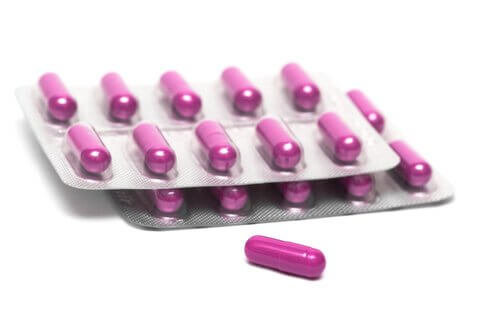

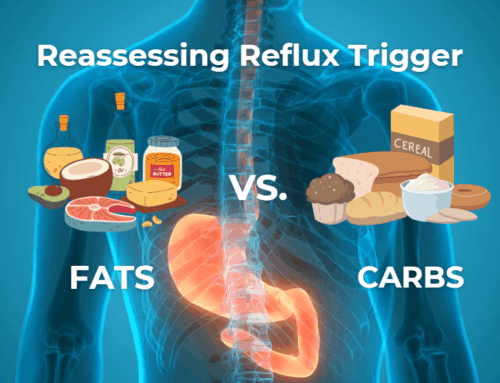
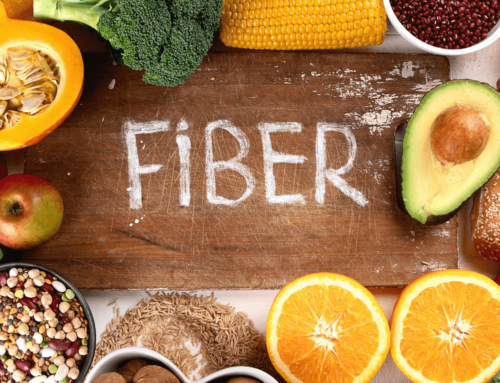
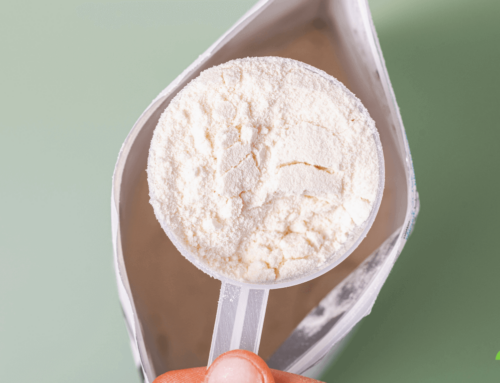
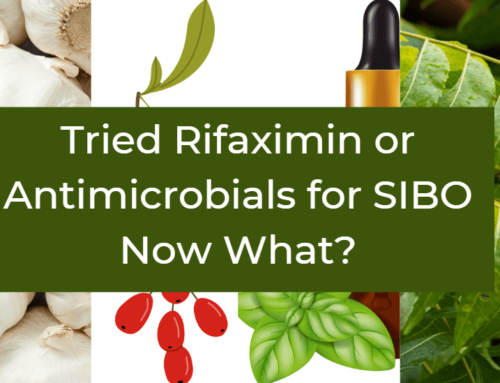
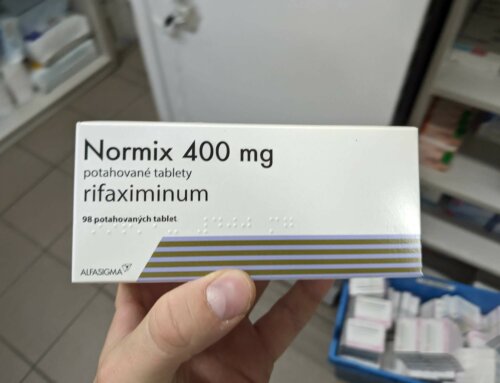
Dr Robillard,
My doctor said that low stomach acidity prevents the digestive enzymes from working and so the food (sugar especially) travels in the intestine and becomes food for the bad bacteria and candida. I think I am low in acidity because when I take the apple cider vinegar after feeling bloated I usually feel better. I read that some people take stomach acidity pills supplements to address the low acidity problem (HCL pills). Based on the advice of a friend, I take Vogel molkosan with L+ lactic acid three times per day before eating. Does this help increase stomach acid? Does it act as a prebiotic, which means it supports the growth of good gut bacteria? Does it make sense to also take digestive enzymes supplements before eating? How about drinking Apple Cider Vinegar in warm water before and after eating to help address bloating and stomach pain? I am also trying hard to understand the links between dysbiosis and chronic severe dry eye conditions, arthritis and joint swelling, all symptoms that, in my case, always flare up several days before, during and sometimes after my menstrual cycles (probably, when my estrogen levels are high). My understanding is that the commercially available probiotics cannot help me repopulate the diverse gut bacteria I need to address these issues because none of them can live in the gut. I have come to the conclusion, together with my doctor, that a fecal transplant would be a more effective alternative to achieve this. I found a very healthy donor, who has not taken many antibiotics and who follows a very good diet. However, she is almost 2 month pregnant. I am concerned that she will soon have unsuitable gut bacteria for my purpose – see research here: https://www.sciencedaily.com/releases/2012/08/120802122506.htm – . What is your view on the choice of a pregnant donor for FMT? Thanks and Kind Regards, Enrica
Five more questions I am struggling to answer.
(1) What is your view on drinking coffee (caffeinated and decaffeinated). What does it do to stomach acid? Why is it often discouraged in the diets against candida?
(2) Is it better to eat raw vegetables or cooked vegetables to address the low stomach acid and candida/yeast overgrowth?
(3) Do essential oils such as oregano oil help or do they destroy all bacteria, including the good ones?
(4) Is it ok to drink yoghurt with pectin? They all have some forms of sugar, even lactose free kefir has 20 grams of sugar!
(5) Why are all my symptoms get terribly worse when I wake up in the morning to the point I am terrified of wakening up?
Thanks so much, Enrica
Last question. You said in another place that the probiotic Boulardii can usually help address diarrhea. I am wondering if you know of a probiotic which is good to address constipation. How about the soil based Prescript Assist?
Once again, thank you so much, Enrica